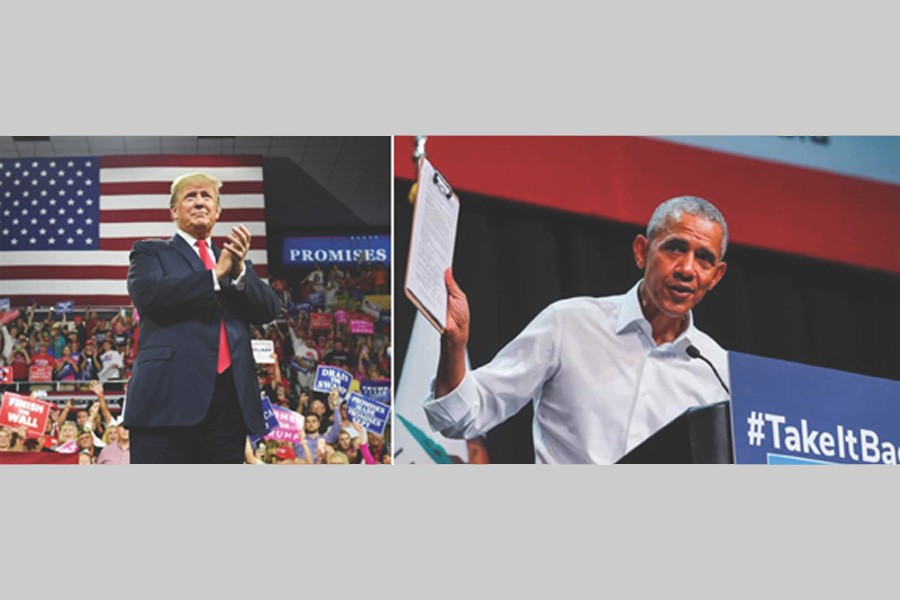The Congressional mid-term elections are extremely important in the US political system. The event draws nationwide attention and debate and is also watched globally. The elections, this time, with higher stakes compared to many previous ones, will be held on November 06, 2018. It is crucial for the future of Donald Trump's Presidency and his conservative legislative agendas.
The mid-term election regularly takes place in the second year of the US President's four-year term. It is accepted as a referendum on the sitting President. The electorates get an opportunity to demonstrate their approval or disapproval of the President's performance in running the country.
In the November elections, voters will choose 35 Senate and 435 House of Representatives members respectively for the 116th Congress. The Republicans currently hold 238 seats in the House of Representatives and the Democrats have 192 seats. However, the Republicans have a slim majority in the Senate with 51 Senate seats compared to 49 by the Democrats.
There is a historical trend in the US mid-term elections. First, they usually have a lower voter turnout than the Presidential elections. Past records show that only about 40 per cent of the registered voters voted in the mid-term elections compared to 50-60 per cent in the Presidential elections. Second, the President's party every time loses congressional seats during the mid-term election.
But this year election rallies show that the voters' enthusiasms in the elections are remarkably high. Hence it is expected that there will be a surge in voter's turnout. Analysts predict that with double-digit poll lead, "enthusiasm edge," and resentment against President Trump, the Democrats seem to have dominance over the Republican candidates.
Historically, mid-term elections are not favourable to the party that controls the White House. In the 21 mid-term elections that took place since 1934, the President's party could increase seats in both the Senate and the House of Representatives on two occasions only. That happened during the presidency of Franklin D. Roosevelt and George W. Bush.
At the moment, President Trump and former Democrat President Barack Obama are engaged in intense political campaigning across the country including fundraising events. Trump will devote more than a month campaigning all over America. He has cautioned his supporters that if the Democrats recapture the House and Senate, he will possibly be impeached.
Indeed, both the parties have also started substantial spending in election publicity and advertisements. According to an estimate, this year the election spending will hit $112 million i.e. 50 per cent higher than the previous mid-term elections held in 2014.
After assuming office, President Trump has alienated the electorates very fast by his contentious domestic and foreign policy and erratic behaviour. Democrats as well as some Republicans have strongly reacted to Trump's healthcare reform, his hard-line rhetoric on immigration, position on gun control, his pro-Russian stance, and reversal of Obama's environment and climate policies.
Moreover, by his repeated offensive remarks, Trump has angered women across the country who constitute more than half of the US population. As a result, the Republican candidates are likely to face the wrath of the women voters.
Despite the fact that the US economy has been performing considerably well and unemployment is about 3.7 per cent, the hostile reactions cited earlier will probably influence voter's decisions as well as outcome of the elections. While Trump is engaged in mobilising his support base, his approval rating has remained low. Currently his approval rating at 42 per cent signals that Republican Party may lose more than the average number of seats.
In fact, latest surveys find that the Republicans are facing an uphill challenge to retain the House. While the Republicans may be able to maintain control of the Senate, the Democrats are expected to take over the House. Polls show that key states, where President Trump won in the 2016 elections, are reversing to democrats.
A few recent polls reveal that most Americans want Democrats to win control of Congress in November. That surely makes the Republicans apprehensive and the President Trump concerned. The Senate majority leader Mitch McConnell said on September 11 that the upcoming senate contests in places like Arizona, Nevada and Tennessee are "too close to call" and every one of them is like a "knife fight in an alley."
In short, the coming mid-term elections will mainly be a referendum on President Trump's policies and programmes as well as his performance. The outcome of the elections will have huge impact on US government, politics and policy over the next two years and beyond.
Dr Kamal Uddin Ahmed is a former Professor and Chairman, Department of Political Science, University of Dhaka.


